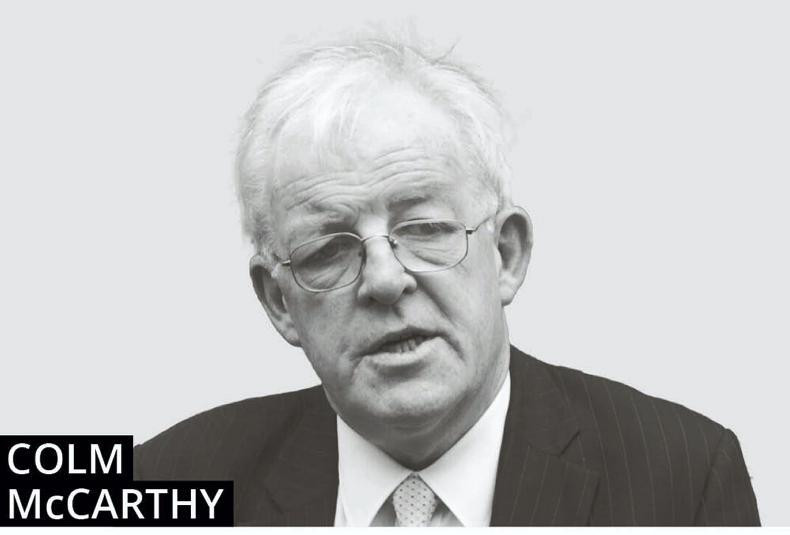Last week’s preliminary judgment at the European Court means that the €13bn case over Apple’s tax liabilities will not be resolved for several more years.
The money rests in an escrow account and will either be handed back to Apple or will accrue to the Exchequer. It could be 2027 or 2028 before the matter is resolved.
Meanwhile, the ongoing revenue from corporation tax has weakened these last few months and there are fears that the bonanza may be coming to an end regardless.
Revenue from corporation tax has doubled in just four years and is a large multiple of what would normally be expected from a levy on the profits of business firms.
This single source delivers one-quarter of the total tax yield in Ireland, versus only 4% or 5% in many countries, since multinational companies, almost all American, are able to route worldwide profits through their Irish operations to avail of lower tax rates here.
The short- and long-run prospects for corporation tax revenue are different and the short-run prospects have nothing to do with the Apple case.
If the recent weakness continues, the Government’s budget picture will worsen but, in the longer term, the bonanza is going to come under pressure in any event. The once-off Apple €13bn is unimportant compared to twice that amount, year-in year-out, if the bonanza continues indefinitely.
The Department of Finance believes that a recurring annual amount as big as the once-off Apple figure should be regarded as vulnerable and should not be spent, especially on permanent recurring programmes.
Politicians are inclined to ignore this advice, spending more in Government or promising more in opposition, while claiming prudence.
On the short-term outlook, monthly fluctuations in reported economic figures are volatile anyway and journalists are prone to read too much into them. Commentators have been opining that the November corporation tax numbers, due for release in the first week of December, will be weak again.
This would matter a lot since November is a big month for corporate tax payments.
The pessimism could be excessive according to Seamus Coffey, an economist at University College Cork, who points out in a recent blog post that there is a historical pattern to these monthly payments, which could result in a pleasant surprise for the Government when the November numbers arrive a few weeks hence.
In the overall scheme of things, it may not matter too much if Coffey is right and the tax commentators wrong, and the eventual decision in the Apple case will not matter either.
What matters is whether Ireland can harvest forever large amounts of revenue from corporate profits earned elsewhere by US multinationals. The excess could be snaffled by EU governments or reclaimed by the US.
Political pressure
The political pressure for a redistribution of the current bonanza is coming from fellow members of the European Union.
The profits tax on iPhones, regardless of where they are manufactured or sold, ends up in Ireland, while the profits tax on Louis Vuitton handbags ends up, on the same basis, in the French treasury
There are proposals that Ireland’s corporation tax receipts should be divvied out in proportion to the sales of the companies concerned in the various national markets.
A high-grade Apple iPhone sells in Paris for €1,500 or thereabouts, as does a Louis Vuitton handbag in Dublin.
There are sales taxes in both jurisdictions which accrue to the French and Irish governments, respectively.
The profits tax on iPhones, regardless of where they are manufactured or sold, ends up in Ireland, while the profits tax on Louis Vuitton handbags ends up, on the same basis, in the French treasury.
Ditto the profits tax on sales of Hennessy cognac and Moët champagne, brands that belong, along with Louis Vuitton, to the giant LVMH luxury goods company.
But LVMH does not have operations in Ireland, the Irish Government collects excise duty and VAT on cognac and handbags in Ireland, but has never suggested that the French treasury should remit a portion of whatever corporation tax LVMH pays in France.
It’s a French company and its intellectual property and brand names generate taxable profits in France.
Apple’s intellectual property and brand names reflect investments made in America and its profits would be taxed at home were it not for indulgent get-outs in the US tax code.
Corporate America has lobbied successfully to keep these loopholes in place and US companies in Ireland have been able to save tax by paying lower tax rates here than apply in their home country.
The worst possible outcome for Ireland would be some EU-led raid on tax revenue here coinciding with an outbreak of common sense in Washington and the reshoring of the taxable corporate profits base, through the unilateral elimination of loopholes in the US system, which Congress is free to do at any time.
Our EU partners need to be reminded that the foreign treasury that is losing out is not in Berlin, Brussels, Paris or Rome, but in Washington.
Can you name one French or German multinational with extensive operations in Ireland?






 This is a subscriber-only article
This is a subscriber-only article










SHARING OPTIONS: